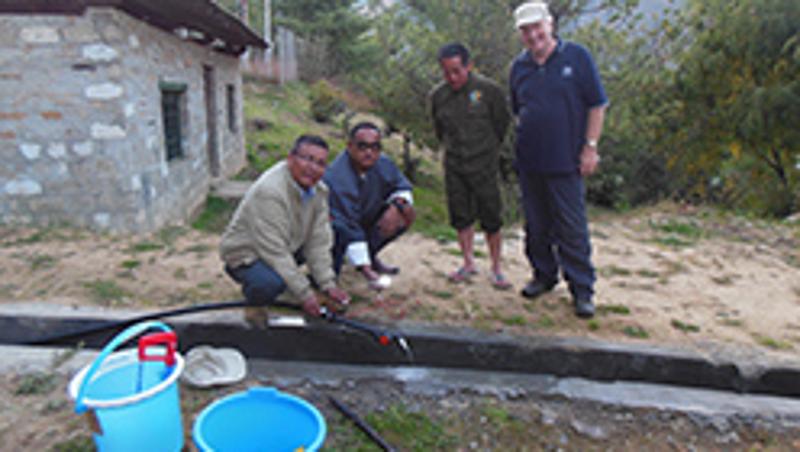
The tiny Himalayan mountain kingdom of Bhutan sits on the brink of disaster – global warming is melting the glaciers high above it, threatening to deluge villages and wash away entire communities.
A QUT team of scientists led by Dr Stephen Hughes has returned from Bhutan after a donor-funded trip to test a simple, cost-effective solution that could literally light up the lives of Bhutan’s remote villagers.
Videos of the expedition's highlights:
- Bush engineering
- Eureka! The first light from micro hydro unit
- Charging a USB power bank
- The botanic gardens unit
- Describing the micro hydro units
- Testing glacial lake siphon
“The glacial lakes that form at the end of the glaciers are getting larger and deeper, increasing the risk the water pressure will break through the natural dam walls that glacial ice has gouged from the rock and stone of the mountains over millennia,” Dr Hughes said.
“If they break, millions of tonnes of water would crash down the steep mountains, devastating crops and livestock and killing people.
“These dam bursts are sometimes called inland tsunamis.”
The team, which included Professor Les Dawes and QUT PhD student Som Gurung, tested a plan to siphon water from glacial lakes and use it to power villages with no electricity, thus reducing the risk of dam break.
“Many people living in Bhutan’s alpine regions don’t have electricity and since Bhutan has so much water in its high-altitude regions these micro hydro units make absolute sense as a cost-effective way of generating power,” Dr Hughes said.
“We installed a siphon in a mountain stream with an outlet in a river just beyond the micro hydro generator and we were able to demonstrate that the generator could power a 12 V LED light and also charge a USB power bank.
“We propose a swap ‘n’ go model to provide cheap electrical power to remote mountain villages, similar to our BBQ gas system – take in an empty gas cylinder and take home a full one.
“The idea is to set up micro hydro units in high-altitude mountain streams and charge a bank of portable batteries – like power banks - at the site.
“People could bring their depleted batteries and swap them with fully charged batteries. The electricity produced by micro hydro units would certainly be enough to supply a village with LED lighting.”
Dr Hughes said the time was right for introducing this power system into remote mountain villages because of the ready availability of micro hydro units (just $8 from China), LED lights which are the USB standard for portable electronic devices, and portable, high-capacity, lithium ion batteries.
“LED lights are energy efficient, leaving enough energy left over from the micro hydro units to charge mobile phones and tablets. This would extend the day of Bhutanese villages and connect them with the world.
“Fortunately, they are well-supplied with wood for heating and cooking.”
Dr Hughes said the project’s next phase was to acquire funding to return to Bhutan to continue the micro hydro work.
“Our ultimate aim is to provide electrical power to remote mountain villages and train locals to install siphons at glacial lakes to reduce the risk of inland tsunamis.”
Media contact: Niki Widdowson, QUT Media, 07 3138 2999 or n.widdowson@qut.edu.au
After hours: Rose Trapnell, 0407 585 901 or media@qut.edu.au.




